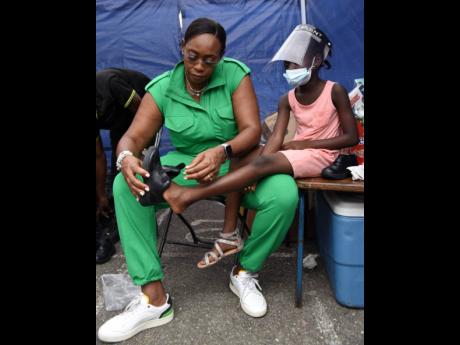Holness calls for more centralised welfare distribution
As the longstanding debate surrounding the role of the Constituency Development Fund (CDF) continues, St Andrew East Rural Member of Parliament Juliet Holness is calling for improved and increased distribution of welfare services through central and local government authorities.
Holness, who chairs Parliament’s CDF Committee, explained that over the years, more and more Jamaicans have come to rely on the CDF, which ought not to be the case.
Each of Jamaica’s 63 lawmakers in the Lower House has a budget of $20 million.
“The Ministry of Labour and Social Security is really where our social services should be handled. It really should not have been from CDF. CDF was an urgent response mechanism, but it should not have been the end-all and be-all for so many persons,” Holness said during a Gleaner interview on Sunday.
“… So I am looking forward to that and to MPs being in a place where we are able to work more with central government to say, ‘OK, let us get our constituency database to get the listing of the persons you have to be on PATH. Let us match it against persons we have identified who still can’t get on so we can see where, if we are, having a gap’,” Holness added.
Holness echoed comments made by Finance and Public Service Minister Dr Nigel Clarke in the recently concluded Budget Debate.
Clarke argued that the Government needs to improve its ability to identify the most vulnerable in society in order to provide more targeted support.
In Holness’ view, greater emphasis is now being placed on achieving accountability and transparency in the public sector. That includes establishing “foolproof systems” that are able to identify persons who are genuinely in need and is part of the process of formalising the responsibilities of MPs.
The St Andrew East Rural representative said that the role of the MP in Jamaica’s political culture needs to evolve from the distributor of resources to the core mandate of lawmaking. With added pressure on MPs to deliver on road maintenance from limited resources, she believes that more focus needs to be shifted to government agencies such as the National Works Agency.
Holness is sympathetic to the lobby for differentiated CDF sponsorship for constituencies like hers, which is vast and hilly with untold road network woes. But she is aware that there is insufficient support for that policy shift.
“It is, in fact, very challenging, but the argument continues to be that one in 63, we are all equals in Parliament, and in terms of CDF funding, it would not be administered in such a way that preferential treatment is given in one constituency over another,” she said.
Additional restrictions are also placed on CDF spending in accordance with the guidelines set by the Revised CDF Operational Procedures.
Holness said that of the $20 million that is allocated, there is a mandatory $1 million for social housing and $1 million for welfare. Five million dollars is mandated for education and a cap of $10 million for infrastructure projects.
Even though the NWA has been identified as a primary implementing agency, a number of MPs have expressed frustration with the length of time for procurement.
For example, in his September 2021 State of the Constituency Debate, Hanover Eastern MP Dave Hume Brown criticised procurement processes, saying that a number of roads earmarked for rehabilitation from as far back as 2016 were yet to be fixed.
However, NWA Chief Executive Officer E.G. Hunter explained that the organisation has to strictly conform with the government procurement policy.
“There is no different or special procurement regime for a CDF project. There is one procurement regime, and that procurement regime is set out in the procurement law, and we would adhere to that 100 per cent,” Hunter said in a Gleaner interview on Sunday.
“Persons who don’t have the responsibility to implement the [Public Procurement Act] will have a different perception of what is a reasonable time and what is not a reasonable time. I don’t make those judgements,” he added.
Hunter shared that in preparing a road, the Government not only aims to improve the road, but also to ensure that there is value for money, equity, and to verify that contractors are not of “unseemly character”.
According to the NWA boss, MPs play an important role in ensuring harmony on the work site and securing labour while the NWA ensures that there is strict conformity to established guidelines.

